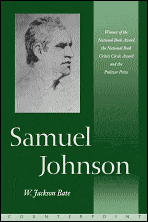AS JACK BATE moved through the ranks of postwar academe, biography was in bad repute. The scholars who came of age in the ’40s and ’50s complimented themselves for going beyond mere biography, favoring instead careful analysis of literary language. Contemporary orthodoxy treated biography, the obsession of the belletristic graybeards now retiring, as nothing more than “background” to the real business of the critic, something best left to others. Harvard scholars didn’t write biographies; they left that to journalistic hacks, and concerned themselves with literary interpretation.
But as most scholars were anxious to get away from biography, Bate embraced the form. He watched with dismay what he called “the radical split, which began in the 1930’s and 1940’s, between ‘literary biography’ and ‘literary criticism.’” He believed it was possible to reunite the two in a true critical biography, using the life to illuminate the works and the works to illuminate the life. How, though, to connect the two? Bate’s approachwas psychological, telling Johnson’s story through his recurrent mental and spiritual crises. Chapter titles tell the story: “8: Breakdown and Despair; Psychology of the Young Johnson”; “21: Approaching Breakdown; Religious Struggles; Fear of Insanity.” But one fortunate product of Johnson’s lifelong mental instability was a remarkable psychological acuity—no one in his century had more penetrating insights into the workings of the mind. Bate’s was, of course, a risky strategy. Too many psychobiographers had brought a shoddy knowledge of a few Freudian themes to major intellectual figures, and wrote simplistic biographies that reduced a lifetime of complexity to a handful of complexes. But Bate, while he used psychology to explain Johnson, was determined not to explain him away.
The result of this determination was Samuel Johnson—after thirty years still a standard biography for scholars, and still one of the most readable accounts of Johnson’s life for lay readers. Bate unearthed few new facts in the archives, working mostly with familiar sources, but he provided a new framework for the familiar facts. And while he was sufficiently scholarly to satisfy most professional Johnsonians, he also thrilled the larger public. Bate had always been a kind of crowd-pleaser; his legendary lectures at Harvard, especially his class on “The Age of Johnson,” attracted hundreds of students, many of whom can to this day quote his lectures from memory. The enthusiastic reviews in national newspapers and magazines, though, brought Johnson to the attention of countless people who would otherwise never have paid attention to a gloomy critic and poet. Bate’s Johnson was not the caricature of a sharp-tongued and pompous blowhard, but the deeply devout scholar wrestling with spiritual and intellectual crises as he endured “a life radically wretched.” Such a melancholy figure hardly sounds like a sexy pop phenomenon for the late 1970s, but SamuelJohnson even earned Bate an appearance in People magazine. The same issue sports “The New Elton John” on the cover and offers news on the Sex Pistols—odd company for an eighteenth-century scholar, but Bate somehow made it work.
Today biography has once again become fashionable in English departments, and life writing is a critical growth industry. But few literary biographies in the last thirty years have had the wide scope, the lasting impact, and the easy readability of Bate's Samuel Johnson, and fewer still have successfully tied life to works. That Bate was a critical biographer before critical biography was hip, and that his work remains nearly as fresh today as it was in 1977, is a testament to Bate's stature as a biographer, as a critic, and as a writer.
—Jack Lynch is Associate Professor in the English department of the Newark campus of Rutgers University. He is the author of “The Age of Elizabeth in the Age of Johnson” (2003), “Samuel Johnson's Insults: A Compendium of Snubs, Sneers, Slights and Effronteries from the Eighteenth Century Master,” (2004), and editor of “Anniversary Essays on Johnson's 'Dictionary.” (2005). His most recent work is “Becoming Shakespeare: The Unlikely Afterlife that Turned the Provincial Playright into the Bard.” (2007)


